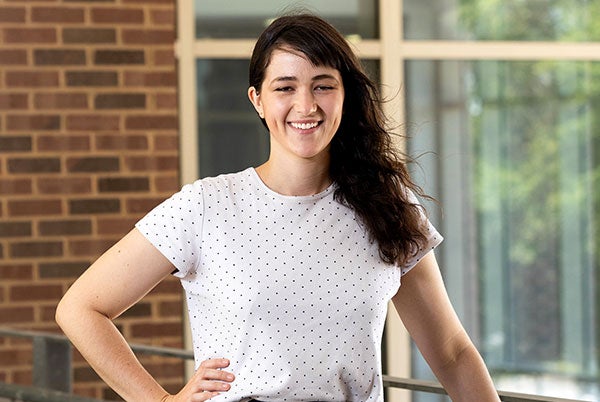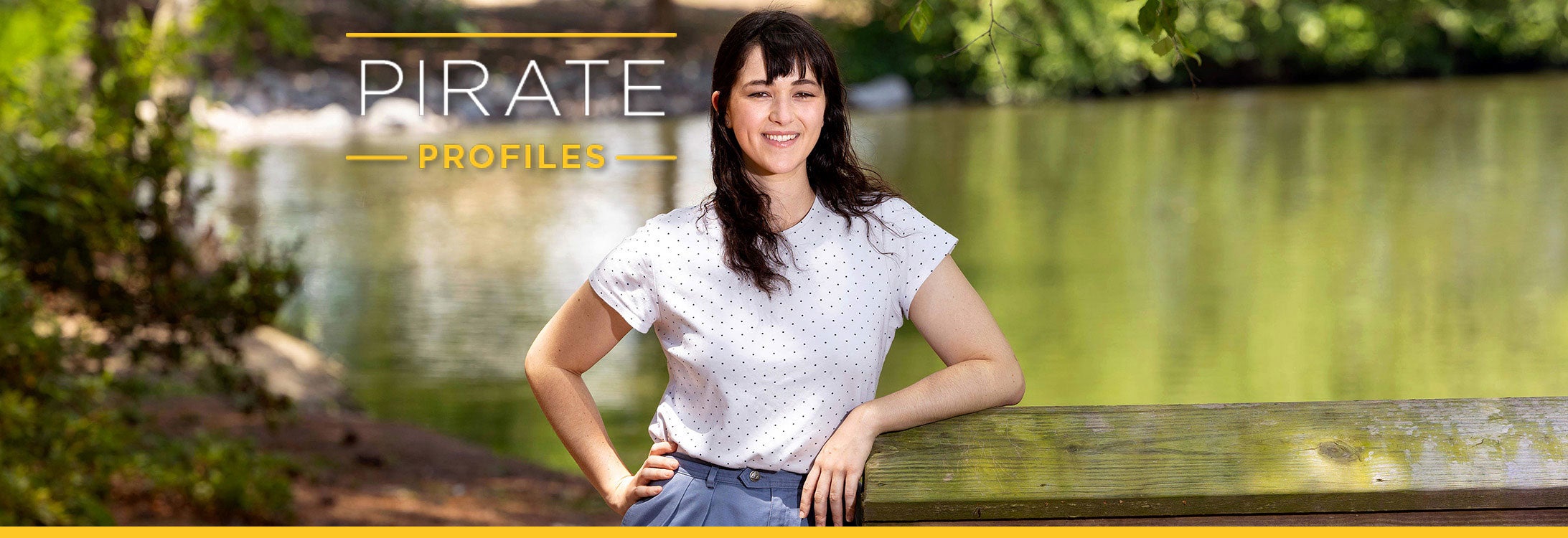Student: Rose Baker
Sometimes finding your purpose, and your way to a home you couldn’t have planned for, takes some time. For Rose Baker, a doctoral student in East Carolina University’s College of Allied Health Sciences, that sense of purpose is focused on helping older people remain vital and valued members of their community by improving the way the rest of us communicate with them.
Baker’s list of homes, collected as part of an Air Force family, is typically long and meandering — “Idaho, California, Washington, Japan for six months, then Washington again. Idaho again, Utah,” Baker recounted. Her father was a chaplain before he retired from the service, and her parents now live in Virginia.
She comes from a family of five kids, all of whom have excelled in their own ways. One sister lives in Durham with her family, a brother is in law school in Nebraska, another brother is moving to Virginia from Utah, and her baby sister just moved to Zambia to take up a post with the Peace Corps.
Baker is equally a high achiever: She graduated a year early from high school and then spent a year living with two German families in a small town east of Cologne, none of whose members were proficient in English. For 10 months she attended a German high school and was forced to learn the language.
“I’d taken a semester of college level German before I left, but that got me about 5 minutes into meeting somebody,” Baker said. “It was a real trial by fire, I just had to figure things out as we went. I found it really humbling to live in another language.”
Finding Her Path
Baker said her time in Germany triggered a passion for knowing how language works. Her initial impetus was to view language through the lens of anthropology, and she took that flowering interest in the mechanics of language to Gordon College in Wenham, Massachusetts, northeast of Boston.
Her time at Gordon was challenging – the school was managing budget cuts, which thinned the number of linguistics faculty and the Covid-19 pandemic put a wrench in everyone’s plans – but Baker settled into her research and the Christian community at the heart of the college.

Rose Baker, a second year PhD student in the Rehabilitation Studies program at the College of Allied Health Sciences
“I had been moving around so much my whole life, I didn’t have a lot of deep, close friendships. And that’s the part of going to a traditional school that I wanted,” Baker said.
A major part of the school’s ethos is outreach, specifically translating religious texts into languages that have little, if any, written representation in the form of a script or alphabet.
“It was a powerful experience because it was an outlet for me to learn about, and think a lot about, minority language development. Historically the first thing that happens in minority language development is you translate religious texts,” Baker said.
Baker was confronted with the realities of translation firsthand while participating in a Summer Institute of Linguistics internship in Cameroon, where she studied under a missionary to untangle Bafanji, a language spoken by a small tribe in the western region of Cameroon.
“We taught some local seminary students how to do translation on their own, basic theory about like morphology and syntax. A lot of them were writing in their mother tongue for the first time,” Baker said, remembering the experience as rewarding to watch.
She graduated early with a bachelor’s degree in theoretical linguistics and kept a strong relationship with her mentor at Gordon, Dr. Susan Bobb. After some time resolving “a bit of a quarter-life crisis” by moving to Durham to live with her sister and working as a linguist for a nationally known language improvement business — she moved to Ipswich, Massachusetts, near the Gordon campus because the rented room in a house built in the 1700s was perfect for a remote job and a perfectly comfortable place to regroup.
“Every day was so beautiful that I kind of couldn’t believe it, it was amazing,” Baker remembered.
Soon she decided to set aside the idea of translation work because it wasn’t filling a need that the research increasingly had when she was still a student.
“I kept being frustrated that I couldn’t do more research; I’d rather understand more of the science,” Baker said. “The translation world is changing so that local people are doing more and more of it themselves, which I think is a good thing. If I’m going to be irrelevant soon anyway, I might as well try to go a different direction.”
Breaking Down Barriers
Susan Bobb, her mentor at Gordon College, had a close colleague at East Carolina University — Dr. Kathryn Rothermich, associate professor of Communication Sciences and Disorders at the College of Allied Health Sciences — who offered an opportunity to be part of her research team while Baker completed her doctorate. Rothermich’s research was right up Baker’s alley: How does social communication work in the brain; in particular, how do doctors and medical professionals communicate with people with limited English proficiency?
Baker’s personal research focus proceeds from Rothermich’s research – theories and methods that serve as a foundation for her own work.
Baker is intrigued by how people speak to older adults.
“We know that there’s a dynamic where even people who are aging well or are healthy tend to eventually have memory issues and not be able to hear as well. Over time all of that affects communication,” Baker said.
The accumulated challenges that older adults often encounter has led to a cultural patronizing, a dumbing down, of how younger generations communicate with older generations, which Baker and her linguistic research colleagues refer to as “elderspeak.”
“The motivation to use elderspeak is typically to build rapport and facilitating communication, but it can backfire when it’s not needed or overdone,” Rothermich said.
Baker wants to use her work to break down some of the sclerotic communications barriers that older people unfairly face.
“My intuition is that healthy aging versus more extreme cognitive decline will determine how patronizing an older adult perceives elderspeak to be,” Baker said. “I think that there might be tests we could develop based on cognitive aging that help us understand how to better communicate with an older adult.”
Baker has ideas about how her research might positively impact older people – helping family members to be more self-aware about how they communicate with their elders as well as improving doctor-patient relationships.
Studies show, Baker said, that doctors don’t ask older patients as many questions and discount their pain symptoms, and nursing home workers are dismissive of older people because of gulfs in communicative capacity.
While Baker’s research isn’t singular, it is necessary because of the general lack of research into older people’s lives – and especially their communication needs.
She plans to observe study participants in her lab and measure the pitch of speech they can hear and how their eyes move when trying to comprehend that speech, responses that register a person’s capacity to receive communication.
“There will be more older people who are bilingual or multilingual, or non-native speakers of English in general. So that’s how I’m planning to combine my previous love of minority languages with my future interest in aging, I think that it could be really cool.”
The future of the United States, and North Carolina in particularly, will be exponentially more diverse that it ever has been, especially in terms of an aging population, Baker said.
“Unique to her work is also the inclusion of cognitive, theoretical and clinical aspects of aging, using neuroimaging, and considering cultural background and language proficiency. Rosie is an exceptionally bright student and she’s involved in many different projects in my research lab,” Rothermich said. “She’s excellent at supervising other students and is on her way to be one of the leaders in the field.”
Baker feels increasingly content with her decision to become a Pirate. She has a loving church community, a boyfriend and a fulfilling research agenda that allow her to establish roots in a community that she never set down as a child of a military family.
While she has yet to lead a class of her own, Baker thinks her educational path forward will likely include being a faculty member at a small college, to afford future students an opportunity to enjoy learning as much as she has.
“If I like teaching, then I’ll probably try to do a postdoc and transition into a faculty position somewhere. I really loved my undergrad experience,” Baker said.
STATISTICS
Name: Rose (Rosie) Baker
College: College of Allied Health Sciences
Major: Rehabilitation Studies
Age: 24
Classification/Year: 2nd year Doctoral Student
Hometown: Beverly, MA
Hobbies/interests: Spending time with friends, Jigsaw puzzles, walking in the woods, reading, painting
Clubs and Organizations: Graduate Professional Student Senate (Secretary), EEG Club
FAVORITES
Favorite hangout: Blackbeard Coffee Roasters
Favorite place on campus: Main campus library (in the stacks)
Favorite place to eat: EC Pho
Favorite class: Discourse Analysis
Professor who influenced you the most: Dr. Kathrin Rothermich (ECU) and Dr. Graeme Bird (Gordon College)
Favorite TV show: Abbott Elementary
Favorite band/musician: Jess Ray
Favorite movie: The Secret Life of Walter Mitty
Favorite app: Daylio (mood + habit tracker)
MOTIVATIONS
Dream job: Professor at a small college, traveling to do research on minority language groups
Role model: Jane Goodall
Your words to live by: No feeling is final.
What advice do you have for other students? Ask for help if you need it. Networking is not just a job-hunting skill; I think the best thing anyone can do is try to build a network of people to live with in community.
READ MORE PIRATE PROFILES
